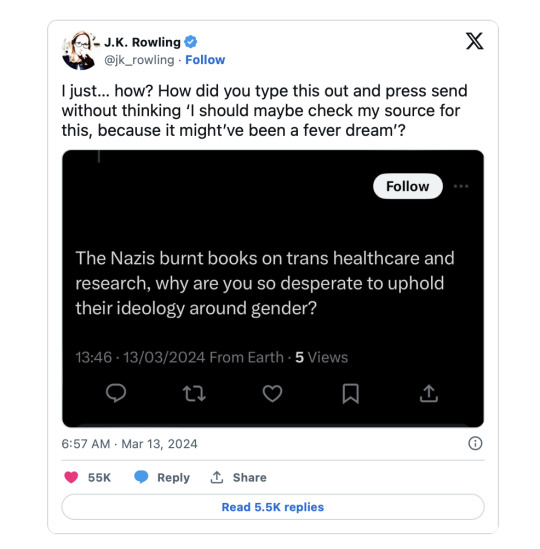#They're talking about the Experimental Human Rights Violations
Text





Having an angry little friend can be good when you need someone to be pissed on your behalf
#I've always found it very cathartic when people get angry over stuff I've kinda chilled about#I'm no good at being mad but I like to be bitchy on my friends behalf so they can feel the vindication without being mean lol#Fuyuhiko kuzuryu#Hajime hinata#Sdr2#Super danganronpa 2#Danganronpa 2#Kuzuhina#They're talking about the Experimental Human Rights Violations#An art#I think everyone should get to indulge in punching things about their issues just as much as they should cry and laugh abt it
2K notes
·
View notes
Text
An excellent rundown from The Stranger on JKR's Holocaust denial. As a Jewish woman who lost actual family in the Holocaust, her twisting of the narrative is genuinely offensive and harmful.
Hey all, it’s Vivian. If you've freed yourself from wandering the wasteland of weirdos and robots on x.com, you may not have seen a series of tweets from JK Rowling about trans people and the Nazis. Rowling first questioned if Nazis ever burned research on trans people (they did) and then linked a thread excoriating problematic grandaddies in the field, implying that trans medicine carried on a eugenic or Nazi legacy of human experimentation (it doesn't).
I really hate inaccurate history, so I called someone who actually knows what the hell they're talking about, University of Washington's Laurie Marhoefer, the leading expert on trans people and the Nazis. You just can't unpack this complicated, nuanced bit of history in a tweet.

A memorial in Tel Aviv dedicated to the LGBTQ victims of the Holocaust. URIEL SINAI / GETTY
Yes, JK Rowling, the Nazis Did Persecute Trans People
We Asked the Leading Expert on the Topicallot Initiative Success in Western
VIVIAN MCCALL Last week, children's book author JK Rowling tweeted some more nonsense about transgender people. In this case, she disputed the fact that Nazis destroyed early research on the community:

Despite Rowling’s dismissal, it is an established fact–not a fever dream–that the Nazis persecuted transgender people. And it’s not the first time this debate has come up on social media. Denying this history is part of an overall effort to discount the discrimination trans people still face in their pursuit of fundamental rights today. It is important to remember the truth and to evaluate what research we have, especially at a time when far-right attacks against trans people are increasing in the United States and elsewhere.
The Looting and Burning
In 1933, the Nazi-supporting youth with the German Student Union and SA paramilitary looted the Institute for Sexual Science (Institut für Sexualwissenschaft) in Berlin. The institute collected the earliest known research on gay and transgender people, and it helped people obtain legal name changes, medical treatments, and “transvestite certificates” from local police that allowed them legally to present as their gender.
Days after the looting, Nazis took to the streets to burn the 20,000 books looters found inside the building, and they placed a bust of the institute’s founder, Magnus Hirschfeld, on the pile in effigy. Hirschfeld was out of the country at the time, but he later died in exile in 1935.
In the years that followed, trans people were busted under German laws criminalizing sodomy and wearing clothes associated with their birth sex. They were imprisoned in concentration camps before and after the start of World War II. Some were murdered there. Others escaped with their lives.
We’ve Been Here Before
Since Rowling posted about the subject on x.com, misinformation about trans people in Nazi Germany has circulated widely. Some people have also claimed that the discussion of trans victims of Nazi violence distracts from the “real victims” of National Socialism. In light of this discourse, I called the leading researcher studying trans people and the Nazis, University of Washington professor Laurie Marhoefer.
“My first reaction was, they’re totally wrong,” Marhoefer said of the posts. “They’re not even in the ballpark. My reaction 1.5 was, ‘Oh this is eerie, the same thing happened in Germany two years ago.’”
Back in July of 2022, a graduate biology student named Marie-Luise Vollbrecht, who was known for her “gender critical” anti-trans views, made headlines in Germany.
She tweeted that the Nazis had never targeted trans people, and to say they did “mock[ed] the true victims of the Nazi crimes.” People responded with a hashtag that claimed she denied Nazi crimes. Vollbrecht filed a lawsuit against some of them, claiming their hashtag violated her rights and basically called her a holocaust-denier, which is a crime in Germany. She lost her case, and, after parsing the historical facts, the court officially recognized trans people as Nazi victims. A few months later, Germany’s parliament issued a statement recognizing the queer victims of Nazis and of post-war persecution.
We Don’t Know Much, but What We Do Know Is Grim
That ruling aside, this history is by no means complete. Scholars still don’t know much about the lives of trans people in Nazi Germany. Researchers have only recently started to study the subject and to undo false assumptions that cis gay men and transgender women were essentially viewed as the same in the eyes of their oppressors.
Through years of research and the review of published literature, Marhoefer has identified 27 criminal cases involving trans men, women, and gender nonconforming people in Nazi Germany. Locating them is hard work, and it requires parsing heaps of documents in non-keyword-searchable archives to find police files on a very small group of people that did everything in their power to avoid police detection. Marhoefer has 30,000 Gestapo files on their laptop alone. The little we do know, so far, is grim.
According to research from Marhoefer, beginning in 1933, Hamburg police were instructed to send “transvestites” to concentration camps. A person named H. Bode lived in the city, dated men, dressed in women’s clothes, and once held a “transvestite” certificate. After multiple public indecency and public nuisance convictions, she was sent to Buchenwald, where she died in 1943. Liddy Bacroff, a trans sex worker in Hamburg, died at Mauthausen the same year. Officials sent her there because she was a “morals criminal of the worst sort.”
Essen police ordered Toni Simon to stop wearing women's clothes, as she had done for years. She served a year in prison for disrespecting police officers, hanging out with gays, and speaking against the regime. The authorities called Simon a “pronounced transvestite,” and a Gestapo officer said placement in a concentration camp was “absolutely necessary.” She ultimately survived.
Unlike today, Marhoefer said, trans people were never a front-and-center political issue for the Nazis, nor were they rounded up in the same systematic way as Jews or the Roma. Nevertheless, the Nazis did specifically target them for their gender identities. On a fundamental level, transness was incongruous with Nazi ideology, a hyper-masculine fascism that emphasized purity and traditional gender roles.
The enforcement of moral laws prevented them from living as they did in the Weimar Republic era, the democratic government in power before Adolf Hitler and a time of limited acceptance. Magazines, nightclubs such as the Eldorado, and nascent organizations for trans people were shuttered. The state forced detransition, revoking a permit from at least one person named Gerd R. and driving them to suicide.
“I think we expect the crackdown, and then it’s all over their media, but it’s quiet,” Marhoefer said. “How many in a camp do we have to find before people will be like, ‘Okay, there was persecution?’”
While the Nazis did not often discuss transness much, at least one 1938 book, Ein Beitrag zum Problem des Transvestitismus, provides some idea of how party officials thought about trans people.
Author Hermann Ferdinand Voss described trans people as “asocial” and likely criminals, which justified “draconian measures by the state.” Nazi rhetoric also linked trans women and pedophilia, which mirrors the contemporary allegations from conservative Republicans about trans and queer people “grooming” children.
When they came after Hirschfeld, who was gay and Jewish, propagandists also framed homosexuality as a Jewish plot to feminize men and to destroy the race. Years before Nazis stormed his institute, the pro-party newspaper Der Stürmer labeled him the most dangerous Jew in Germany, which brings us to another point Rowling shared in a thread on X.
Problematic Granddaddies
After x.com users told Rowling that Nazis did, in fact, persecute trans people and burn research about them, she accused people who corrected her of valorizing Hirschfeld, rather than doing what they were actually doing, which was simply correcting the record.
Indeed, Hirschfeld, the granddaddy of the gay rights movement and a pioneer for trans health care, was a eugenicist. Furthermore, the early practitioner of vaginoplasty, Erwin Gohrbandt, who operated on Lili Elbe of The Danish Girl fame, was a Nazi collaborator connected to Dachau.
History rightly doesn’t look back on eugenicists and Nazi collaborators fondly, but those facts have nothing to do with whether or not Nazis persecuted trans people or burned research.
Apparently unsatisfied with spreading historical misinformation in one instance, Rowling followed-up with a tweet that directed users to a “thread on the persistent claims about trans people and the Nazis.” The thread implies that trans medicine is eugenic or Nazi in some way, and it draws a false connection between gender-affirming care and tortuous human experiments in the camps.
Broadly, the thread argues that early trans medical care constituted medical malpractice and the development of a new kind of sterilization in the form of gender-affirming genital surgery, and it contends that Gohrbandt performed his early vaginoplasties with the same regard for humanity as he displayed in his later work with the Nazis.
But the beliefs of these flawed medical pioneers have no bearing on trans people or trans politics, and conflating modern gender-affirming care with this early experimental treatment ignores the state violence trans people faced at the hands of the Nazis.
Despite Hirschfeld’s contributions to the field, people are right to criticize him for seeing the world through the lens of eugenics, even if that view was common in the 1930s.
Marhoefer literally wrote the book on his eugenic beliefs. Hirschfeld thought that gayness was eugenically beneficial because queer people did not reproduce, but he made no eugenic arguments for or against his work with trans people. He dedicated one of his books to eugenics, and he believed they sat at the heart of the science of sexology. And while he was critical of scientific racism, you can find anti-Black statements in his work, too, Marhoefer said.
Moreover, while Hirschfeld’s writings suggest he empathized with trans people and wanted to alleviate their suffering, he still staked a career on them. He photographed trans people in demeaning ways and trotted them out for demonstrations in front of other doctors.
It’s important to remember that Hirschfeld did not invent or create transness. The community existed before he discovered it, and the trans people themselves were not advocating for eugenic sterilization. The man was a trailblazer, not a saint. In fact, his approach to trans medicine laid the foundation for a system that forces people to jump through hoops for medical care. To this day, the majority of people who do trans medicine are not transgender themselves, and they do not always have the best interests of trans people at heart, Marhoefer said.
Gohrbandt would certainly make a list of medical practitioners who did not always have the best interests of trans people at heart. The pioneering plastic surgeon’s career bloomed along with his field, which quickly advanced to treat disfiguring battlefield injuries from World War I. He did not work at the institute, and because the surgeries were still very rare, he didn’t make a living performing them, Marhoefer said. We can count on one hand the number of gender-affirming surgeries he performed.
Unlike the Jewish and leftist doctors he worked with, Gohrbandt did not have to flee Germany. He endorsed the regime and later became the chief medical advisor for the Luftwaffe’s sanitary services division. In 1942, he participated in a secret conference on the results of fatal hypothermia experiments performed on Holocaust victims, and later reported the results in a German surgical journal.
Marhoefer said it is not strange that a future Nazi worked with progressive Jews on gender-affirming care in the 1920s. Many German doctors backed the regime and committed atrocities because they wanted careers.
There’s no defending Gohrbandt, but his path does not suggest anything unique and nefarious about gender-affirming care. It says more about the heartbreaking situation these trans people found themselves in when even the few doctors they could turn to for medical care treated them with disdain.
Marhoefer said doctors of the day took advantage of desperate women such as Elbe, Dora Richter, and Charlotte Charlaque, who was Jewish and fled the Nazis. They endured experimental surgeries with no oversight before antibiotics, patients’ rights, or ethics protections. Many doctors saw them as a means to an end in the overall development of plastic surgery.
What All of This Is Really About
Trans persecution is simply one story in a much larger one about the Holocaust. Trans people today who point out this history as right-wing attacks against them intensify around the world are not erasing the murder of Jews and Roma in concentration camps, or the extermination of disabled people, or the deaths of millions of Soviet POWS in Nazi Germany’s murderous campaign to seize eastern territory and farmland.
But this conversation is not really about Nazis any more than constant squabbles over gender-affirming care are about children. Nor does it honor victims of Nazi crimes.
No information, scholarship, or detailed account of a complicated history can satisfy someone who is fundamentally opposed to a person existing as they do. No number of mainstream medical organizations that again and again defend the efficacy of gender-affirming care can assuage their doubts. The benchmark for correctness is constantly moving and shifting, and the argument has no logical endpoint.
Meanwhile, ordinary trans people who rise to their own defense are labeled activists and needled for their wording, or their temperament, or their appearance, or the smallest misstatement.
At the same time, people like Rowling expect transgender laypeople to possess the knowledge of Holocaust researchers, of doctors, of psychologists, and of public policy experts. Every week, it seems, anti-trans interests push out another poorly researched hit meant to undermine the community’s existence in some way. It is trolling, and it is exhausting, and that’s all it is.
23 notes
·
View notes
Note
I was rewatching DGM hallow and I remembered that Lavi and Bookman occasionally engage in telepathic conversations. How come I've never seen this talked about more in all the years I've been in this fandom? This is really weird. Even most of the Noahs think it's weird/creepy when someone reads their thoughts/talks in their head. The more I think about the Bookman the creepier they get. I'm not implying they're evil. Just really weird. 1) Telepathic w/each other. 2) Not only against attachments-
2 but against having a heart (not even the past Jedi at their most radical taught padawans to not feel anything). 3) If Bookman and Lavi are the standard then they either think they're above humanity or hate humans or or just indifferent. 4) they have SO many secrets that they keep to themselves no matter what. 5) they will never feel loyalty for anyone/thing that doesn't further their own ambition and even then they can easily drop you like you mean nothing to them. 5) They routinely erase-
3 each other's minds and none of them remember their birth names. 6) they swap identities so many times their own growth as individuals is trivial. 7) Ever single (possible) bookman we have met has either exhibited creepy or hostile behaviour. 8) they take to neutrality so strongly you can question if they even think to care what will happen to them if the Earl's plans succeed. 9) Are they even self aware? I'm not expecting a complete disaster. But I am expecting the bookman to weird me out.
Okay so for the telepathy i will have to come back to it when i will re-read it bc i don’t really remember it in Hallow and I think the scene I think should be that one??? Is the fact that ii’m almost certain i remember it being confirmed that Lavi and Bookman talk a whole other language. Apparently the Bookmen would have had their own language and I think i remember that in the manga it was translated by having weird bubbles to specify they were talking in that language (and it is possible that, due to the fact the anime couldn’t just pull a new language that was a work around to still have one of their Bookmen conversation being visible using telepathy).
But i really don’t remember the scene in question in details so i will have to check that out again but I THINK it is Bookman Language related more than telepathy and that the telepathy was a way for the anime to translate it
THAT SAID if the idea of Telepathy is a thing (which tbh could still be??? Bookmen already messes with minds a lot with the whole deleting memories thing who knows the hell they can do) it could explain also a lot of much more silent looks that we kinda justified so far by “they know something we don’t”. It might have been conversations we missed.
Still unsure though i’ll get back to that when i will properly have re-read those parts bc this is really intruiguing me now
I know the fandom had talked about the Bookman’s language though but i’ve never heard of telepathy before now?? Idk
And yeah like you say this is very weird bc putting them on the same level as Wisely is... very weird. Besides considering how much Lavi still struggles to get people around him i am fairly certain that if telepathy there are it i between the Bookmen only, not all knowing as Wisely.
But yeah aside from that, mood. The Bookmen are seriously a creepy brunch. Not in a bad way, but in a “this is extremely shady and I get you’re doing that to be neutral but i’m not sure those means are actually legally or morally applicable”
I agree with all your points.
and i’ll elaborate under cut bc i might have gone carried away,
well 1) i just discussed it there, either Telepathy which would be a whole new can of worm, or a whole other language that would still applies that they have a special language to keep secrets in. And tbh it would also make sense that they would write down records in a secret language since they don’t actually let people Read their reccordings: Bookman specify that it comes with the part to “chat a lot”, they won’t share the written reccords (which they MUST HAVE for the the survival of the clan), so “Secret Language no one else in the world know” rings as shady to me.
4) NOT TO MENTION we know that Bookman also keeps secrets from Lavi (when meeting Cross’s altered akuma, Bookman specifies it was only something he (and Cross) knew about.). And it’s not to mention secrets that the Bookman in charge keeps from the rest of the Clan (see again, how Lavi’s eye is only known by Bookman Sr, not anyone else in the clan seems aware of that)
6) Apparently about their switching identities, something very creepy that came out of the latest Komui corner too is that the name they have during a war is the name that the recording will officially get. Meaning it’s not even that “Lavi” calls himself like that for the people around him, it’s that even after Jr would have moved on or died or anything, the Records of the Holy War would still be called “Lavi”. And we know that the names picked seems to have meaning that applies to each wars (as Wisely smugly smile realizing Lavi’s name’s meaning, but doesn’t tell people). So even more of a disconnect with their sense of humanity since they have to be distanced from their own names, as their names become history as it goes. Which makes Jr’s identity crisis over how “Lavi” is “him” even more creepy tbh, bc it extends that “Lavi” isn’t just a reccord name anymore, it is not just the Holy War anymore, it is part of Jr as a BEING. And to me that’s even creepier that it’s even something Lavi has to worry about.
8) this is honestly one of my biggest questions. If the Earl’s plans work, all humanity will die. Or at least there had been no mention so far of any “saved people that would go through the Ark”. (there had been speculations about the real purpose of the Akuma and how its evolution process would be perhaps a part in creating supperior beings to salvage during the Flood like the original Ark did, and i’ll need to get back to the chapters tha thints that there are more secrets to the Dark Matter than it just reversing the innocence, BUT personally I have issues with this theory because of how easily the Noah do torture and kill the Akuma at times and seem to look down on them. But I would agree there seems to be a bigger purpose to the Akuma and the Dark Matter that we cannot even imagine.)Regardless, I don’t see anyway for the Bookmen Clan to survive, else the Noah would have found way to keep them on their sides and not torture them like they do now and exclude them. Yet we know at some points the Bookmen were “on the Noah’s side”. So what the hell do the Bookmen expect to happen with the Flood? Is their neutrality so important that they are ready to litteraly go down with this ship when the end of the world come? Yet we know they have some self preservating instinct it seems, so why? It just enerves me so much!
9) Yeah same, basically.
One last thing i will add: How the HELL did Bookman manage to find himself and Lavi innocences he knew they would be accomodator to when they decided to join the Order? Bc the Corner mentions that Bookman decided to set them into the Order to watch BEFORE they even got in contact with the innocences, and Lavi mentions that “Gramps just knew we’ll find innocences we would be compatible with” and how????? How the hell??? You can’t just make it that easy for the two of them to randomly connect with two random innocences (and we know they’re the one who have shown the least actual connection with the innocence) after arcs and arcs proving that the innocence is picky and sentient, that its own personality affects who they end up picking, that even the synch can change depending of how the innocence feel to their acomodator, and Especially, that the Order had DECADES of experimentations that were basic human rights violation due to how desperate they were to not be able to have enough people synchronizing with the innocence.
You cannot have a full arc of telling us the Order did an entiere experiment about bringing fallen exorcists’s brains back in new bodies in hope the innocence would synch with said bodies, while letting those bodies decay under the pain of the innocence, for the sLIGHT CHANCE an innocence could be compatible again, only to then tell us “oh yeah we wanted to join the order so we ended up finding two innocences that we could connect to.”
For exemple: Take the Crows. it’s obvious the Crows want to help the holy war, as the Third Exorcist project proved a whole brunch of people were ready to put Dark Matter in their body to fight back the Akuma. And from all those Crows, from all the experiments we know the Order have carried on, somehow, as long as we don’t know of a “Former Crow Exorcist”, it means it’s not that easy. Not when you have a whole military branch who would be willing to be God’s apostles. And it’s not even counting how others Orders’s soldiers like the Finders would or not jump on the occasion.
So how the hell did they do that? How the hell did Bookman find those? bc even if they don’t connect to their innocence on an emotional level, they seem like proper innocence. Else Allen would have commented about how the souls don’t disappear like planned, like when he saw how the Third Exorcists killed the Akuma. Besides, we also know Bookman fears Lavi’s innocence could turn into a crystal type, so it confirms this is legit innocence, and that Bookman doesn’t have full controle over it.
How could Bookman be so sure they will become accomodator BEFORE finding any innocences? It raises seriously worrying implications considering all we know about the innocence and how hard it is to find accomodators for it this far in the saga.
*take s a deep breath* anyway that said,
tbh part of me understand the feeling of “wanting to disconnect your feelings” when you watch history happens, because history is goddamn overwhelming. For having studied history for a few years i’ve personally had a few breakdown just over thinking about the amounts of horrors you read about one year after the other, so to have to remember all those horrors AND reccord current horrors, I understand in principle the thought that shutting those emotions down is the easiest way to record it.
In principle.
Because in practice this is (a lot like you compared) nearly impossible witout losing their humanity and even losing perhaps an important part of how to understand and translate human experiences through emotional lenses. That’s the major issue with this logic.
had they done that for so long they don’t even question it? Or are they perfectly aware that it’s exactly why they cannot afford emotions? what are their view on the world and it coming to an end? How far are they willing to go in order to keep their own secrecy and status squo? Do they even realize the possible irony of them “not meedling with history” while the only fact that they are meddling by taking the dispositions they do to remain hidden/uninvolved? Not to mention that wanting it or not, Bookman and Lavi had meddled in the Holy War. Would they remain fully neutral, Bookman wouldn’t have had to tell everything he knew about the Noah to Komui in his first appearance for exemple.
Lately it seems like they seem more interested in the Noah losing (self preservation kicking in) but that does raise the question of how far they are willing to share the secret history and how much is considered “medding with history”? Because this “secret knowledge no one should have” IS changing the course of history by being shared.
Do they even realize or do they really see themselves as walking books who can deliver information if pressed a the condition it doesn’t require to dig in their secrets? Where do they draw the lines?
I have HUNDREDS of questions about the Bookmen and it drives me insane. I won’t exclude that i might be overthinking it bc man, gotta wait between chapters huh, and that perhaps it won’t be that complicated or deep, but the more you get to see how shady the Bookmen are the more you wonder how and why?
Anyway that fascinates me. Bookmen pls unlock your secrets,,
5 notes
·
View notes